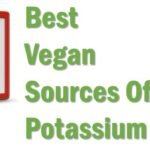Xanthan gum is a food additive that’s commonly used in order to thicken foodstuffs, but, is xanthan gum vegan? There is no simple answer, some versions are, and some are not. In this article, we will teach you what to look out for.
What Is Xanthan Gum? [In Brief]
Without getting too technical or science-y, xanthan gum is derived from a macro-molecule that has sucrose, simple sugars, and glucose.
This in combination goes through a fermentation process that includes the addition of nitrogen, and dipotassium phosphate too.
Once left for a few days, a solid matter is formed.
The polymer is then processed and transformed into a powder that may be added to food or beverages.
Approved back in 1968, it may show up on food labels as E415, xanthan gum, or is sometimes spelled xantham gum.
What Products Are You Likely to Find Xanthan Gum In?
The number of foods that may have xanthan gum is numerous. Now you are more aware of it, you will soon see that it is a common food additive that crops up in no end of products.
It is an emulsifier and thickening agent, so it can help to bind oil and water together or thicken sauces.
This is why it’s particularly beneficial in prepared foods.
Products that you are likely to find xanthan gum in include;
- Ice Creams
- Soups (including fresh)
- Fruit Juice
- Baked Products (especially gluten-free baking)
- Condiments (mayo, ketchup, hot sauce, etc)
- Salad Dressings
- Toothpaste
Due to its flexible usage, it’s a hugely adaptable food additive which also explains why it remains in use over half a decade later.
Is Xanthan Gum Vegan?
Great. Ok, so I understand what xanthan gum is now. But is xanthan gum vegan?
Some xanthan gum is vegan whereas others are not because some of the ingredients were originally derived from animals.
Therefore, while the ingredients are vegan in a sense, that’s not the end of the story.
The main issue is the various sugars used and where they came from.
Some can come from sugar cane, for instance, and this is fine. Others might come from animals, and this is not.
Check out this article for more on what it means to be a vegan.
When Might Xanthan Gum NOT Be Vegan?
Several issues with xanthan gum being vegan or not come into play here.
Sugar is the primary concern, followed by the carbohydrates used, and then the enzymes.
Sugars in Xanthan Gum [Are They Vegan?]
Where did the sugars used in the formulation, and fermenting processes to create xanthan gum originally came from. Were they from animals as a byproduct, or were they from other, vegan-approved sugary sources?
Carbohydrates in Xanthan Gum [Are They Vegan?]
The second issue is if the carbohydrate ingredients will be acceptable?
For example, whey is often added as a cheap carb, but it is animal-derived.
This would then make the xanthan gum non-vegan too.
Enzymes in Xanthan Gum [Are They Vegan?]
Lastly, if enzymes in the purification process originated from animals, this is a third potential issue.
One process that uses lysozyme and alkaline protease may use ingredients from animals, namely turkeys, ducks, geese, etc.
Where The Xanthan Gum Was Produced
There are lots of foods that aren’t labeled vegan because they were produced in factories that might also produce dairy or other animal products, but they don’t specify which ones. Xanthan gum is no different.
WOW!
I bet that was a lot more than you thought you would have to consider when asking whether xanthan gum is vegan or not.
Check out this article for more on vegan struggles.
Don’t worry though, as promised we will take you through how to check whether your xanthan gum is vegan.
How to Check if Xanthan Gum Is Vegan?
The safest route is to look for the vegan logo assurance on the product.
While obvious, we state this here because it’s difficult otherwise to check if the xanthan gum used inside the food or beverage is vegan or not.
As a consumer, it’s extremely complicated to know whether the purification process used enzymes derived from animals.
Likely the packaging won’t confirm either way.
Whey may have been added to the list of ingredients too.
This isn’t uncommon due to its affordability; it’s derived from diary-based cheese. Look out for this on the ingredients list. However, if it has been used within the production of the xanthan gum itself, it may not be listed.
Vegan-approved sugar replacements such as sugar cane, sugar beet, soy, corn starch, and others might be shown on the label.
This may or may not indicate that the fermenting process only used sugars that a vegan would be okay with.
A food or beverage could have adopted an animal byproduct sourced fermenting process but used vegan sugars in the final dish to sweeten it.
The above is why we suggest looking for vegan logos wherever possible as a first step, and always checking the list of ingredients as the second.
So whether you are willing to eat products containing xanthan gum, without knowing these details will depend on your own values.
More than likely you’ll be ok, however, there are no guarantees.
Use Your Own
Ok, so this does not help if you’re buying products that already contain xanthan gum, but if you are cooking (or baking) at home, there are plenty of vegan-friendly xanthan gums which you can buy.
This should give you peace of mind.
Vegan-Friendly Substitute for Xanthan Gum
If you do not like the ambiguity of xanthan gum, guar gum may be a good alternative for you. It is vegan-friendly as well as offering similar properties to xanthan gum.
Final Thoughts: Is Xanthan Gum Vegan?
More than likely, yes, your xanthan gum is likely to be vegan, however, this is not always the case. There are a number of questions you should be asking about the origins of the products which have led to the production of the xanthan gum. Good news though, if you are cooking, or baking at home, there are plenty of certified vegan xanthan gums which can be bought.
What are your thoughts on xantham gum as a vegan? Do you use it, or not?

